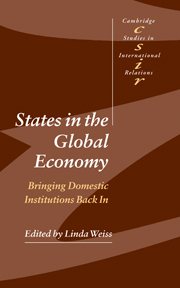Book contents
- Frontmatter
- Contents
- List of figures
- List of tables
- List of contributors
- Preface
- 1 Introduction: bringing domestic institutions back in
- Part I The resilience of welfare states
- 2 Disappearing taxes or the ‘race to the middle’? Fiscal policy in the OECD
- 3 Withering welfare? Globalisation, political economic institutions, and contemporary welfare states
- 4 Globalisation and social security expansion in East Asia
- Part II New economic challenges, changing state capacities
- Part III Governing globalisation
- List of references
- Index
- CAMBRIDGE STUDIES IN INTERNATIONAL RELATIONS
3 - Withering welfare? Globalisation, political economic institutions, and contemporary welfare states
Published online by Cambridge University Press: 22 September 2009
- Frontmatter
- Contents
- List of figures
- List of tables
- List of contributors
- Preface
- 1 Introduction: bringing domestic institutions back in
- Part I The resilience of welfare states
- 2 Disappearing taxes or the ‘race to the middle’? Fiscal policy in the OECD
- 3 Withering welfare? Globalisation, political economic institutions, and contemporary welfare states
- 4 Globalisation and social security expansion in East Asia
- Part II New economic challenges, changing state capacities
- Part III Governing globalisation
- List of references
- Index
- CAMBRIDGE STUDIES IN INTERNATIONAL RELATIONS
Summary
Globalisation theory suggests that internationalisation creates strong pressure on policymakers in democratic polities to retrench the welfare state. The exit option accorded mobile asset holders by capital mobility purportedly encourages policymakers to compete for transnational investment; in the strongest versions of the theory, potentially costly social expenditures are reduced to the ‘lowest common denominator’. The exit option may also enhance the conventional political resources of mobile enterprises as well as strengthen arguments for neoliberal welfare reforms. Trade openness supposedly generates similar pressures: policymakers in open economies encounter demands for reductions in welfare-related labour costs to promote the price competitiveness of exports and otherwise enhance efficiency.
Here, I advance an alternative view. My recent work (e.g., Swank 2001, 2002) argues that institutional features of the polity and welfare state influence the relative capacity of pro-welfare-state interests to defend social protection. I extend these arguments in the present context by exploring how the ‘production regimes’ of coordinated and uncoordinated market economies are related to, and reinforce the political consequences of, national political and welfare state institutions. My central argument is that globalisation has not led to significant welfare retrenchment in coordinated market economies; coordinated market institutions shape the interests, strategic choices, and capacities of labour, capital, and the state in ways favourable to the maintenance of social protection. Alternatively, globalisation has contributed to welfare state retrenchment in uncoordinated market economies.
- Type
- Chapter
- Information
- States in the Global EconomyBringing Domestic Institutions Back In, pp. 58 - 82Publisher: Cambridge University PressPrint publication year: 2003
- 17
- Cited by

